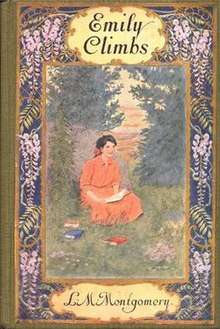Emily Climbs
Emily Climbs is the second in a series of novels by Lucy Maud Montgomery. It was first published in 1925. While the legal battle with Montgomery's publishing company (L.C. Page) continued, Montgomery's husband Ewan MacDonald continued to suffer clinical depression. Montgomery, tired of writing the Anne series, created a new heroine[1] named Emily. At the same time as writing, Montgomery was also copying her journal from her early years. The biographical elements heavily influenced the Emily trilogy.
 First edition cover | |
| Author | L.M. Montgomery |
|---|---|
| Country | Canada |
| Language | English |
| Series | Emily series |
| Publisher | Frederick A. Stokes |
Publication date | 1925 |
| Preceded by | Emily of New Moon |
| Followed by | Emily's Quest |
The book's United States copyright was renewed in 1953.[2]
Introduction
The poem To the Fringed Gentian[3][4] was the keynote of Montgomery's every aim and ambition.[5] Like Montgomery, Emily climbs the symbolic "Alpine path" to be a female writer.
"The Flash" is an extraordinary experience common to both Montgomery and Emily, but not shared with Anne Shirley.
| The Alpine Path (1917) | Emily of New Moon (1923) Chapter 1 |
|---|---|
| It has always seemed to me, ever since early childhood, that, amid all the commonplaces of life, I was very near to a kingdom of ideal beauty. Between it and me hung only a thin veil. I could never draw it quite aside, but sometimes a wind fluttered it and I caught a glimpse of the enchanting realm beyond—only a glimpse—but those glimpses have always made life worth while. | It had always seemed to Emily, ever since she could remember, that she was very, very near to a world of wonderful beauty. Between it and herself hung only a thin curtain; she could never draw the curtain aside—but sometimes, just for a moment, a wind fluttered it and then it was as if she caught a glimpse of the enchanting realm beyond—only a glimpse—and heard a note of unearthly music. |
Plot summary
Emily Byrd Starr longs to attend Queen's Academy to earn her teaching license, but her tradition-bound relatives at New Moon refuse. She is instead offered the chance to go to Shrewsbury High School with her friends, on two conditions. The first is that she board with her disliked Aunt Ruth, but it is the second that causes Emily difficulties. Emily must not write a word during her high-school education. At first, Emily refuses the offer, unable to contemplate a life without any writing. Cousin Jimmy changes the condition slightly, saying that she cannot write anything that is not true, meaning she must not write stories for the duration of her high school education. Emily does not think this much of an improvement but it turns out to be an excellent exercise for her budding writing career. Although Emily clashes with Aunt Ruth and Evelyn Blake, the school's would-be writer, she starts to develop her powers of storytelling. Through a series of adventures, Emily is furnished with materials to write stories and poems, and even sees success with the short story "The Woman Who Spanked the King." In the meantime, Emily also begins to see romantic possibilities for her life. She and Teddy Kent draw closer, but due to misunderstandings and interference from Teddy's mother, the romance stalls. Emily also refuses a proposal from Perry Miller, and continues her long-lasting friendship with Dean Priest. At the end of the novel, Emily, now a budding young writer, chooses to remain at her beloved New Moon rather than leaving for New York with famous writer Janet Royal.
Series
| # | Book | Published | Emily's age | |
|---|---|---|---|---|
| 1 | Emily of New Moon | 1923 | 10 - 13 | child |
| 2 | Emily Climbs | 1925 | 13 - 17 | early teen |
| 3 | Emily's Quest | 1927 | 17 - 24 | young adult |
Adaptations
Television series
The novels were adapted into a TV series by Salter Street Films and CBC Television in 1998.
Animation
In 2007, Japanese educational TV broadcast "Kaze no Shoujo Emily" which was inspired by the novels.
Musical
The Gateway Theatre in Richmond played the musical Emily.
Translations
,,Emily - Bagolykacaj" and ,,Emily - Forgószél" (Hungarian)
References
- Writing a Life: L.M. Montgomery (Canadian Biography Series), Mary Rubio, Elizabeth Waterston
- Catalog of Copyright Entries (Vol. 7, Pt. 1A, No. 1): Books, Jan-June 1953. Copyright Office, Library of Congress. 1954. p. 334.
- L.M. Montgomery's Personal Scrap book
- L. M. Montgomery's Fringed Gentian
- The Alpine Path: The Story of My Career (Penn Library), 1917
External links
- Emily Climbs at Faded Page (Canada)
- Online text of Emily Climbs (Project Gutenberg)
- L.M. Montgomery Online Formerly the L.M. Montgomery Research Group, this site includes a blog, extensive lists of primary and secondary materials, detailed information about Montgomery's publishing history, and a filmography of screen adaptations of Montgomery texts. See, in particular, the page about Emily Climbs.
- Emily Starr An L.M. Montgomery Resource Page
- Official Website of the Government of Prince Edward Island, Canada
- Emily of New Moon Debuts on Canadian Television
- Emily of New Moon Official Website of NHK
- Playbill News: Canada's Emily, of New Moon, Sings Again in Revised Musical Revival
- The L.M. Montgomery Literary Society This site includes information about Montgomery's works and life and research from the newsletter, The Shining Scroll.